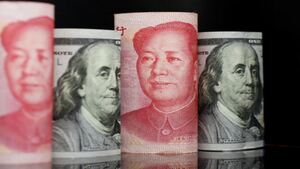The trade tensions have been coupled with a string of measures and hints from monetary authorities suggest they may be on the money.
A growing pile of foreign exchange deposits at banks and a rise in currency swaps show Chinese corporates and households are wagering they can exchange their dollars for more Yuan if they wait.
That conviction, in the face of the US Dollar's broad-based slide against most other currencies, is driven for the most part by central bank's efforts to keep the currency steady and even encourage more investment offshore.
It also shows the People's Bank of China (PBOC) is in a bind. A sudden Yuan move in either direction could trigger a wave of selling of billions of Dollars by businesses and households, either to catch better Yuan levels or to stave off losses.
China's Yuan has strengthened 1.5% against the flagging dollar since April 2, when US President Donald Trump announced punishing trade tariffs on scores of countries, leading to market ructions that have eroded confidence in US economic policymaking and the Dollar's haven appeal.
In the same period, currencies such as the Thai Baht, South Korea's won and Taiwan dollar have risen between 6% and 14%.
The Yuan has spent most of 2025 in a narrow range between 7.15 and 7.35 to the Dollar, its weakest levels in 4-1/2-years in trade-weighted terms.
The export sector, comprising a fifth of economic growth, is grappling with higher US import tariffs of as much as 55% going by the latest trade framework agreed between the world's two biggest economies in early June.
China was initially singled out with tariffs exceeding 100% and has until August 12 to reach an agreement with the White House to keep Trump from reinstating additional import curbs imposed during tit-for-tat tariff exchanges in April and May.
"Considering the external risks from US trade policies, China needs to maintain a very competitive currency with respect to other markets outside the US," said Eugenia Victorino, Head of Asia Strategy at SEB.
--Reuters--
Economy
- ${title}
Loading...
Economy
China Inc bets Beijing will keep tight grip on Yuan as US tariff fears persist

Date: Jul 8, 2025
Chinese businesses and investors are primed for the Yuan to stay steady for now and eventually depreciate as United States (US) trade tensions drag on
Web Content Viewer (JSR 286)
- ${title}
Loading...
ADVERTISEMENT
Economy
- ${title}
Loading...
Web Content Viewer (JSR 286)
- ${title}
Loading...












